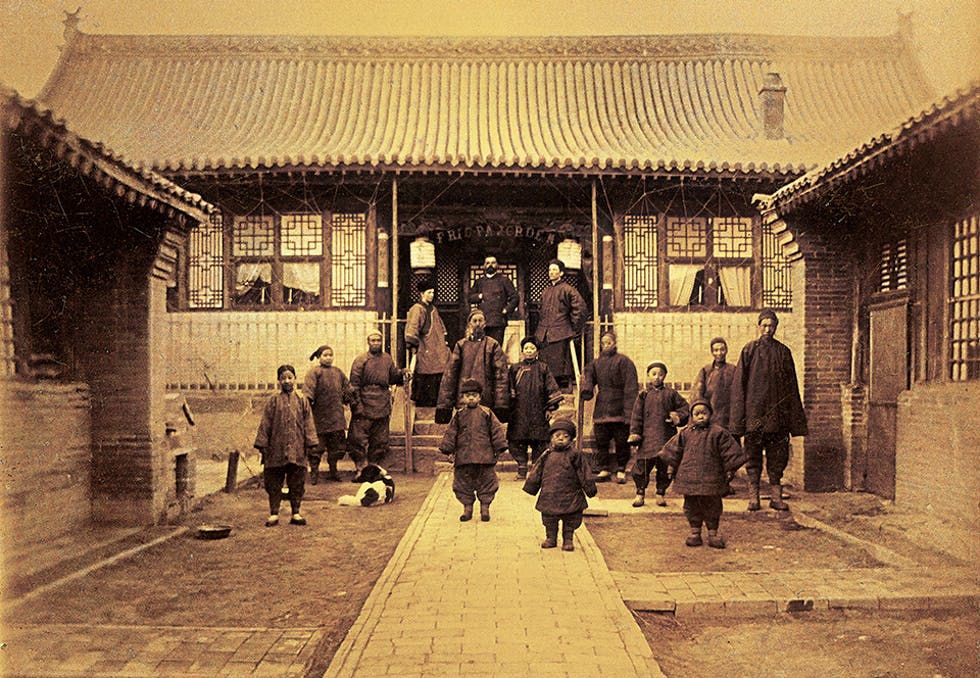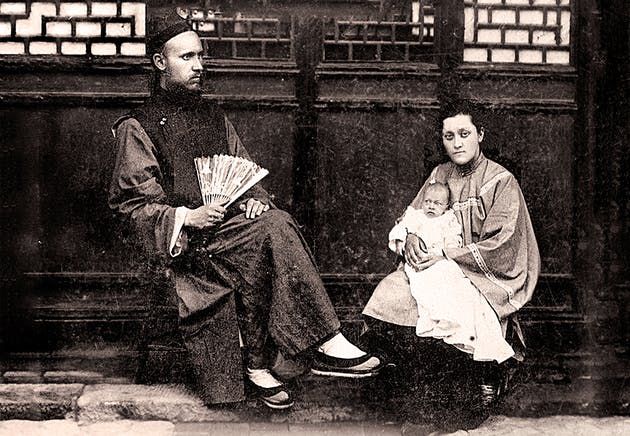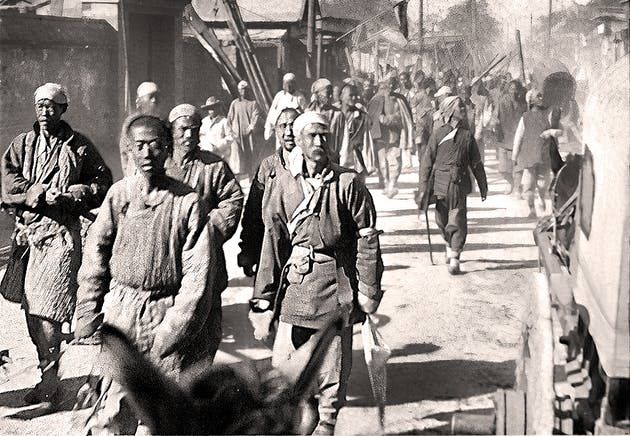
农妇,母语一般,其他语言更一般,但这些都没有能阻挡我对各种语言和文字的热爱,哪怕是看看也好。
A Road of No Return - Swedish Missionaries Who Died in the Boxer Rebellion in 1898-1901
Since the second half of the 19th century, various churches in Sweden have sent missionaries to China. Their scope of activity spread almost all over China and lasted until 1949. When they preached in China, they experienced upheaval in society, politics and culture. There were also missionaries killed during the Boxer Movement. According to written records, there were 56 missionaries and their children killed at that time. The following is their experience.
On August 16, 1900, in Mongolia, northern China, Swedish missionary Karl Lundberg was writing a letter, beginning with: "What you do is so strange, who can understand you?"
In midsummer that year, when missionaries from the Anglican Church (the Swedish Christian Free Church) gathered for a meeting at their mission center in Shuoping, Shanxi Province, they were attacked by many thugs. The missionaries managed to escape and took refuge in the local yamen, but were soon detained there.

The next day, 12 of the missionaries and two children were loaded into a wagon, which they thought was to be taken to a safer place, but this was not the case. In the early morning of June 27 (it is also recorded as the 29th), they were sent to the city gate by horse-drawn carriage. A large group of people pulled them from the carriage and smashed them with stones. The bodies of the two children were dismembered by the angry crowd. . The limbs of the rest of the dead were amputated, and then their heads were cut off and hung on the city gates for public display.
anger and violence
The popular movement that began in 1898 reached its climax in 1900, with participants calling themselves the "Fist of Justice" and the British called them "Boxing of Justice", a movement known as the Boxer/Boxer Uprising. This was the resistance against the Western powers and Japan's gradual penetration into China at that time, as well as the resentment against the corrupt Qing Dynasty's inability to maintain national sovereignty. The movement gradually became a channel of anger and violence, mainly targeting Christian Chinese and "foreign devils".
At that time, missionaries often preached in very remote places, but they were still found and killed. In addition to British missionaries, Swedish missionaries were also the main targets of attacks at that time, because the locals only looked at their appearance and did not care about their nationality.
Why the missionaries have such a fate, we also need to start from the history of Christian mission.
The Situation of Christianity's Mission in Early China
In the early 16th century, Portuguese sailors came to China, thus establishing the Macau trade point in the southern seas. Before long, merchant ships from Spain, Holland and England also arrived. Subsequently, China was involved in the global trade triggered by the discovery of the Americas, and exchanged luxury goods such as porcelain, tea, and textiles for large amounts of South American silver. China has thus become a winner in global trade, resulting in a large trade surplus, a vibrant economy and strong population growth.
For more than 300 years, China has always been in a dominant position in trade. Those who want to trade in China have to admit that China's supremacy status. Since 1759, foreign trade has been mainly in Guangdong, which is closely monitored by the Qing court. For a long time, Europe had little trade advantage.
Shortly after the Portuguese landed in China, the first missionaries, mainly the Jesuits, also entered China, and the Chinese were quite polite to them. The Jesuits respected local traditions and succeeded in winning the hearts of the Chinese people. However, ordinary people's belief in the Lord was carried out in secret, because the mission of foreign religions was strictly prohibited by the Qing government. In the mid-18th century, however, there were about 300,000 Catholics in China.
Things changed in the early 19th century, when China was already far behind Europe, especially in military technology. And the trade of one commodity that made China no longer has a surplus is opium. Smoking opium was originally a pleasure in China's upper class, but by the beginning of the 19th century, it had become a common practice among all classes of society, including women.
The opium trade was lucrative, and the main player was the British East India Company. In addition to its far-reaching social impact, opium also had a devastating effect on the Chinese economy. Since the payment was in silver, this meant that China's trade balance quickly turned negative and the tax burden increased dramatically.
In order to eliminate the bad consequences caused by opium, the Qing government began to crack down on the opium trade, and at the same time confiscated and destroyed opium, but the effect was very limited.
The Opium War launched by Britain against China from 1839 to 1842 is considered a watershed in Chinese history, and China was utterly defeated by the modern British army. The war was a huge humiliation for China, with territorial losses, including Hong Kong, in addition to military defeat.
After the Opium War, China suffered further humiliating defeats in wars with Western powers such as Britain, France, and Germany. The Chinese were forced to swallow the reality that they were inferior to the Europeans, and what was even more humiliating was their defeat in the war against Japan, China's little Asian brother, in 1894.
The Chinese are no longer completely masters of their own country, and foreign stakeholders increasingly control the country's economic life. In addition, China was once again forced to admit missionaries, even though this was considered an insult to local culture in many parts of China.
concentrated in coastal cities
Initially, missionaries were concentrated in coastal cities. The same goes for the Swedish missionaries, the first to arrive were Anders Elgqvist and Carl Joseph Fast of the Lund Mission Society, who established in the port city of Fuzhou in 1850 the church. But the missionary activities did not go well, Fast was killed in a robbery, and Eggquist escaped and returned to Sweden. As you can see from this incident, violence is an inevitable part of missionary life in China.
Decades later, Protestant missions in China took off, thanks in large part to the English missionary Hudson Taylor (1832-1905). He has mobilized funds and missionaries to preach in China. In 1865, he established the Chinese Inland Missionary Group. In 1876, China and Britain reached an agreement to open up areas outside China's coastal cities as missionary areas. Afterwards, Taylor traveled all over the hinterland of China and established missions. The number of Protestant missionaries in China rose more than ever before: 473 in 1877 and 1,296 in 1890.
Swedish missionaries have the vision to see China
The Christian revivalist preacher Franson (1852-1908) met and was inspired by Taylor. He recruited 200 missionaries in Scandinavia to preach in China.
Another Swede in relation to Taylor was Erik Folke (1862-1939). He first came to China in 1887, and in the same year he established the Swedish Mission in China (Ruihua Society). In 1898, there were 369 Swedes registered in China, of which 214 were missionaries.

Many missionaries are keen to learn the language and embrace Chinese culture, they dress according to local customs and keep their hair in braids. But there are also some missionaries with colonial thinking. Because of disrespecting Chinese traditions, some missionaries also clashed with the locals, especially the Manchus, because they felt that their authority was challenged by the missionaries.
Growing conflict and starvation led to the Boxer movement
Assassinations of missionaries frequently occurred, which became an excuse for Western governments to demand compensation and further concessions from the Qing government. But at the same time, missionaries carried out missionary and other activities in the vast Chinese countryside. There were few hospitals and schools in rural China at that time, and it was missionaries who used their knowledge to care for the sick, treat opiate addicts and conduct popular teaching activities.
In 1898, due to drought, poor harvests and famine, the Boxers raised the banner of an uprising in Shandong. Homeless and starving farmers believed the Boxer rumours, such as missionaries poisoning wells. At the same time, coupled with a sense of suffering for the family and country, the Boxer Movement spread rapidly in northern China.

Farmers protect missionaries
At first, the Boxers killed Christian compatriots, and at the same time attacked the telegraph office, railway station and other buildings that were related to foreigners in their eyes, but rarely directly attacked foreigners. By the summer of 1900, the atrocities of the movement had escalated, and more and more foreigners were being killed. At the same time, a large number of Boxer members have been concentrated in the city, and they even besieged foreign embassies in Beijing.
But even in this situation, farmers and officials risked their lives to protect the missionaries, trying to save the missionaries who were kind to them from the Boxers.
Ultimately, the Boxer Rebellion was quelled by confrontational negotiations with the Qing court by foreign missions in China, including Russia and the United States. On August 14, 1900, the Allied Forces arrived in Beijing and lifted the siege of the Boxer regiments against the embassies of various countries.
Sign the "Xin Chou Treaty"
In 1901, the Qing Dynasty signed the "Xin Chou Treaty" with 11 countries. The Qing government faced compensation of 450 million taels of silver, which had to be paid in installments until 1940 (but Sweden gave up its compensation claim). The plan of various countries to carve up China has not been realized. The main reason is that they think that the result of doing so in China is similar to that in Africa, with less advantages and more disadvantages. And the Qing government survived, and its corruption and incompetence continued.
The Qing government once supported the Boxers
At the same time as the Boxer Rebellion, the Empress Dowager Cixi staged a coup to depose the Guangxu Emperor, and contemporary commentators generally see her and her supporters as the driving force behind the Boxer movement, whose purpose was to weed out foreigners. But then the movement got to the point where she couldn't control it either, and it ended in failure and reparations.
The later fate of the Swedish missionaries
Exactly where, when and how all 56 Swedish missionaries were killed is unclear. As early as 1901, the book "Swedish Martyrs in China" was published, and through the testimony of missionaries, including Lundberg's letters, Swedish readers saw the unfortunate fate of these missionaries in the Boxer Rebellion.
Before Lundberg wrote the opening letter, he had been fleeing north for several days with his wife and two children, Akselina, and five other missionaries and their children. The destination was Russia, but they failed. They were attacked and robbed eight times along the way, and the last time they were penniless and without a single ration. Just between life and death, they were discovered by a special envoy of a nearby Catholic mission and provided them with protection.
However, they were not spared in the end. On August 22, Lundberg wrote a letter for the last time. That day, their sanctuary was surrounded by the Boxers and the local army. "Now that the soldiers have arrived, they are expected to attack here today," he wrote in the letter.
In subsequent attacks, large numbers of Chinese Christians, missionaries, and Lundberg's entourage were killed. His three-year-old daughter was stabbed to death with a sword. Lundberg, one of his colleagues and a Catholic priest survived the attack from gunshot wounds. But a few days later, they were beheaded. It must be said that it is a miracle that Lundberg's letter survived this catastrophe.
Last moments of Protestant missionaries in China
For Protestant missionaries in China, the Boxer Movement was a blow. But in the longer term, this is a temporary setback. New missionaries filled the ranks of the dead and intensified operations, with 3,719 Protestant missionaries registered in China in 1907 and 520,000 Protestants in 1915. The missionaries also survived subsequent famines, coups, and civil wars.

It is the Communist Party that has truly ended the Protestant missionary activities in China for more than a hundred years in an all-round way. In 1949, the year the People's Republic of China was proclaimed, Christian mission was banned again. The last missionaries left China in the early 1950s.
Like my work?
Don't forget to support or like, so I know you are with me..
Comment…